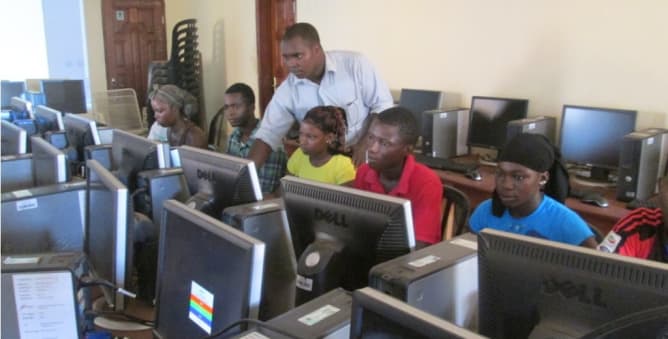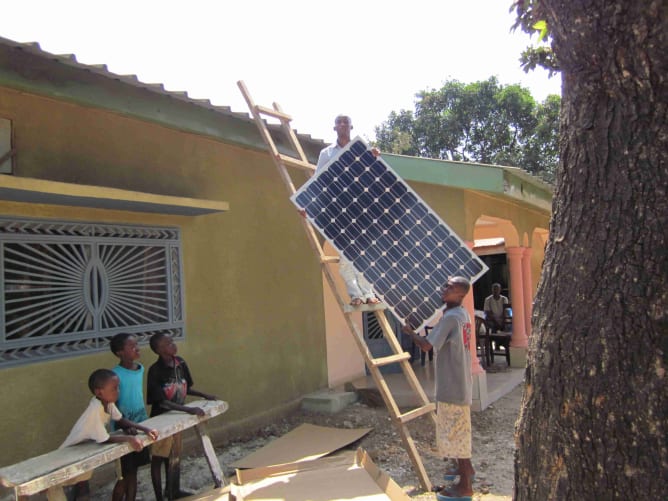Solarnet Africa project
Solarnet Africa: a project aimed at creating computer centers with internet access powered by solar panels. The goal is to teach youth computer and IT skills.
Currently, we have started great work with a pilot project in Guinea. In the past year, ASF has received more than 800 computers ready to be sent into Guinea. This is where your support is needed; in order to send the computers we are looking to raise the necessary funds for the shipment and installation. We also aim to expand the project to Senegal, Togo and Mali.
The project has been implemented locally in Switzerland as follows:
- «I look for a computer»: Second hand computers are collected in Switzerland.
- «I lend a computer»: The collected computers are shipped and lent to professional schools and public administrations in Africa.
- «I train with a computer»: Computer centers are created so individuals can go through training for basic computer skills and new information technology. Training for computer recycling is also offered.
- «I recycle a computer»: Maintenance, repair and recycling are held by ASF. It allow us to insure quality standard in recycling and avoid waste dumped into nature. If a computer is fixable, it is fixed and sent back to the school. If it cannot be fixed, it is dismantled and the electronic parts are transferred to a specialized workshop. Then they are transferred to Europe to be reused.
Thanks to your support, we will be able to open more than 80 computer centers in Guinea in 2016.
Why CHF 8’000?
This amount is a milestone for Solarnet. As mentioned above, we have already collected more than 800 computers. Thus, with your support we will be able to send them to Guinea. This amount will cover the transportation and installation within the country. Your help will make our goal of opening 80 computer centers a reality. Most of the centers, already connected to a power grid, will open immediately. Some of them are located in remote areas and will open gradually, according to the funding of solar panels.
Who are we?
Apprentissages Sans Frontières (Apprenticeship without Borders) is an NGO in the development field. Our work is to promote education through apprenticeship and sustainable development. ASF has been active since 2005 and accredited with the United Nations since 2010.
We promote apprenticeship at an international level. It’s a mean to reduce unemployment, especially for young people. ASF is also working to obtain recognition for apprenticeship at the UN level. The system we are promoting is the Swiss system of Dual apprenticeship. Formation centers have been created offering apprenticeship in different fields, like sewing and fishing. ASF also worked to teach computer literacy through the project Solarnet. We have a strong commitment for sustainable development and environmental preservation. We share those values in every one of our projects. Until now, ASF has been active in the following African countries: Guinea, Senegal, Burundi, Togo and Mali.
Our other projects
We do not only promote apprenticeship, we make it happen. We have numerous projects ongoing which make our goal a reality; we work through the creation of Formation Center or with our Senior Dual project, which connect Swiss people who are retired with young apprentices in Guinea. We create experiences of apprenticeship to show the positive impact of the program in the African countries.
Moreover, ASF is active in training in Switzerland. We offer project management training to all of our co-workers. Starting in 2016, we will open our training to everybody in order to share our know-how that has been successful over the years.
For more information on our project, see our website.
The Solarnet Impact
- Ecological: The collected computers have a second life in Africa. The waste of resources is reduced by using the computers through their entire life-cycle. Moreover, we recycle the computer when they do not work anymore. Ecology and sustainable development are some of our core values for ASF, and we reduce as much as possible of our environmental footprint.
- Education: Solarnet gives young adults the required training for computer literacy and allows them to be efficient with the tools of the 21st century. Implementing computer centers also helps create employment opportunities. The use of solar panels in remote areas allows us to create awareness of green energy and to train individuals in their installation and maintenance.











